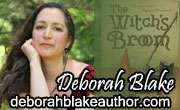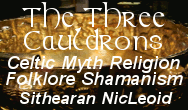Pagan Paths
Into the Coven is a sneak peek into the development and workings of a Wiccan coven. Each monthly installment will explore the history and lore surrounding the idea of the coven. In addition to looking at the coven in history, Jason Mankey will share the growing pains, triumphs, and tragedies of his own working group.
Into the Coven: Being Choosey
When my wife and I started the Oak Court (for those of you new to the column, that's the name of our coven, and the street we live on) we weren't setting out to start a coven. Heck, our little gathering didn't even have a name in those early days and certainly wasn't called "The Oak Court." We simply invited a few friends over who weren't involved in any other small-circles or covens and grew from there.

Out of those initial invitees most have stuck around, but we've lost a few along the way. Sometimes it's been because of jobs, and there have been a few times when someone wasn't a good fit. (We are all pretty much theists in the Neo-Platonic mold, atheist-Pagans ended up not being a good match, though we have no real theology people are expected to stick to.) After our first few rituals, even before becoming a coven, I stopped inviting new people over. Most everyone seemed comfortable with each other and I didn't want to rock the boat. Sadly that would result in a very different sort of boat rocking.
After about a year of being a group people became aware of our existence and began asking if they could join. Joining a coven is generally just not that simple. Before calling the gods and beginning any working I welcome all our coveners with the words: "In perfect love and perfect trust I welcome all of you to another ritual of the Oak Court." Perfect love and perfect trust have to be earned, if I'm going to say the phrase it has to be mean something, so it becomes impossible to let Random Person X simply "join the coven."
My coven is choosey, there's no way around it. I only want to bring in people who are going to be compatible with everyone else in our circle. This bugs a lot of people and has resulted in some hurt feelings. That's certainly never been my intention, but was probably inevitable. Covens are by their very nature exclusionary, something that a lot of people forget from time to time.
When people ask about joining the Oak Court I'm never sure what to say. Is there a nice way to put "I'm not sure you'd be a good fit?" Our ritual structure comes down firmly on the side of Episco-Paganism. We use the same quarter calls every ritual, the same circle casting, etc. If I get the sense that someone will want to make up their own quarter calls while everyone else uses the ones from our BoS they'll never be a part of our coven.
There's nothing wrong with wanting to make up a highly personable quarter call on the spot at each and every ritual, but that's not our style. We've got a ritual system, it works for us, if someone else wants to do things a different way that's cool, just do it somewhere else. We've developed a pretty specific flow, we want to keep that.
Our coven is also very Brit-Trad. The best "open coven" experience I ever had was in a Gardnerian Outer Court and the Oak Court was built in that style. When someone expresses a preference for Starhawk's version of the Charge of the Goddess over Doreen Valiente's . . . . . . well, it usually means they won't be a very good fit. There's nothing wrong with Starhawk's version either, we just like the old, stuffier, antiquated sounding one.
In addition to ritual differences and preferences there are times when someone is just not going to be invited for whatever reason. There could be a history with a member of the coven, a personality clash, all kinds of things. Not everyone is going to be compatible with everyone else and that's OK. That's why there are lots of covens and circles and people are always free to start their own.
Being choosey does have some drawbacks. It's hard to bring in new members for instance. We aren't always looking to "grow" but we also don't want to miss out on a potential coven-mate. Locally everyone knows we exist, but we also don't stand up at open circles and talk about our existence. It's like we are a secret that's not really a secret.
To "open things up" just a little bit we now host two open rituals a year (Ostara and Mabon). They aren't "open" in the sense that we post public announcements about them, but it's a chance to bring in guests and friends. For some of those people it's an opportunity to "test the waters" with us, but mostly it's just a chance to share our ritual experience with friends who probably don't want to be in the coven anyways. I'd love to share our ritual with more people, but we have space limitations, and we meet in our house. We can't invite people over that make the wife uncomfortable.
Most everyone in our coven is also involved in larger, open ritual groups in the area. This has become the best way to bring people into the Oak Court. If we are interested in someone joining our circle we'll ask them to help with one of those open rituals. It's a good way to get a feel for how it might be to work with them. It's not an automatic path to membership, but it's a way to get onto that road. It also serves to see how dedicated and interested people are when it comes to ritual.
There's been another downside to being semi-in-seclusion: it's made me hesitant to teach the Craft publicly. I've thought about teaching "Brit Trad 101" (for free of course) locally but I'm not sure how to go about it. I would hate for anyone to think that taking such a class would automatically lead to coven membership. And then how does one justify taking in one member of the class and not another? It feels like a kettle of fish I don't want to touch. I'm probably worrying about this a little more than is necessary, but despite the title of this article, I do worry about the feelings of others.
I think most people think of a coven as simply "a working group," but I believe there's more to it than that. A coven is also a form of chosen family, and we should be careful about who we choose to be a part of that family.
Comments
-
Please login first in order for you to submit comments




















First, I should say that I totally agree with your understanding of coven as chosen family. I tell people that to be in coven with someone is to be in covenant with them.
So, how to deal with teaching and people's expectations... My immediate thought is this: I wouldn't take anyone directly from a class into a coven. After the course has ended, I'd wait and see who I end up hanging out with outside the structure of the class.
I met one of my covenmates through Pagans Night Out, our local monthly pagan social. She and I got talking multiple times, then started hanging out at other times than just PNO. By the time my coven scheduled a social specifically to invite outsiders who might be potential members, we'd known each other for a couple of years. She'd shown interest whenever I talked about my coven, asking questions and such, but was never pushy.